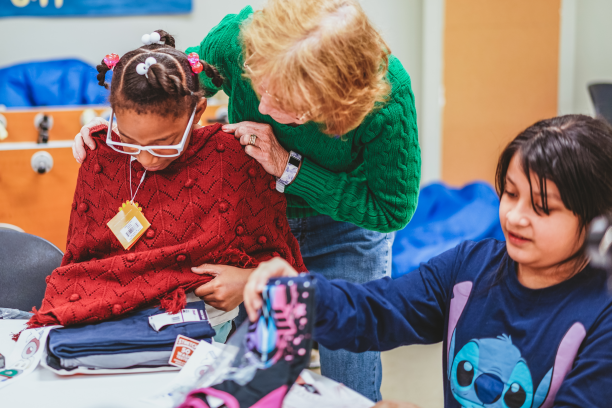On this Global Pay It Forward Day (Apr. 28), don’t be afraid to start the conversation with your kids, because it’s never too soon!
Kids are curious by nature—when they see a natural disaster or pass a homeless person on the street, it’s normal for them to have questions. These moments open up the opportunity to teach them about philanthropy—sometimes by taking action. As a mom of two, this is something I’ve experienced first hand—in particular with my youngest son.
A few years ago on a brutally hot summer day, I was walking around New York City with my younger son, Max. I decided to stop at a food truck to buy several bottles of water for homeless people in the area and had him help me hand them out. This was the perfect introduction for us to have the conversation of the importance of giving back to those in need.
This made a huge impression on him and sparked his charitable drive and ever since he’s been volunteering at the Salvation Army and looking for ways to help others whenever he can.
Not only has this been important to me in my personal life, but as the CEO of KIDBOX, a company with a true heartbeat of social giving, I know more than ever the importance of philanthropy and that it’s never too soon to talk to your kids about it.
With Global Pay It Forward Day right around the corner on Apr. 28, here are my top tips to keep for having this first conversation with your kids:
It’s never too early to have the conversation!
Empathy is something kids can learn from a very early age. I recommend asking your kids how they might feel if they didn’t have any toys at all and how that feeling might change if a friend shared one with them or gave them one.
Start the conversation by explaining to them what philanthropy is.
More importantly, explain why it matters, too. Explain to your kids that giving back doesn’t just mean donating money it can also be donating time and helping bring attention to those in need.
Relate it to a time they needed help.
It’s fairly easy for kids to understand needs—they know what it feels like to experience the emotion of needing something. The best way to help them understand children in need is to talk to them about a time they felt hungry, cold or sick.
Leverage the technology they use often.
In today’s digital age, talking to your kids about giving back and identifying causes they feel passionately about is easier than ever. Browse charities online with your child and explain how the charities help those in need and find educational videos for them to watch on their tablets!
Show them giving back feels good.
Helping them experience what it feels like to practice generosity will create a positive association in your kids’ future—even if the charitable giving is done in an anonymous way. When you share these types of acts of kindness early on, it’s much more likely that your children will also incorporate this kind of compassion as they grow up.
Introduce them to different charities to help them find one they feel passionately about.
Find ways to get your kids involved in giving back, from making meals for the homeless to donating new clothing to children in need, creating moments that open up the conversation will help your kids find the causes they feel passionately about.
Shop brands that make giving back fun and easy.
Shopping brands that give back like KIDBOX, BOMBAS or Art & Eden, that incorporate giving back as a part of their mission, is an easy way to start the conversation with your kids as you select the charity of your or your child’s choice. It’s seamless and integrated into the shopping experience, so kids can see that giving back is as easy and as important as shopping for themselves.
Implement giving back as a part of their routine.
By creating a recurring moment of giving back in your child’s routine, you can help them to understand that giving back isn’t just reserved for times of emergencies, but rather should be something that is a part of their day to day life.
Get them involved in philanthropy-oriented kids groups.
Groups like Big Brothers Big Sisters of America, Girl Scouts USA, Boy Scouts of America or KIDBOX’s Kids Board of Directors help surround your little ones with other socially minded kids their age. Helping them make a bigger impact on their local communities through acts of giving.
Looking for a place to start? Check out KIDBOX’s Look Good Do Good page and join our community through our little leaders or our community moms’ 50 States of Giving & Inspiration program.
